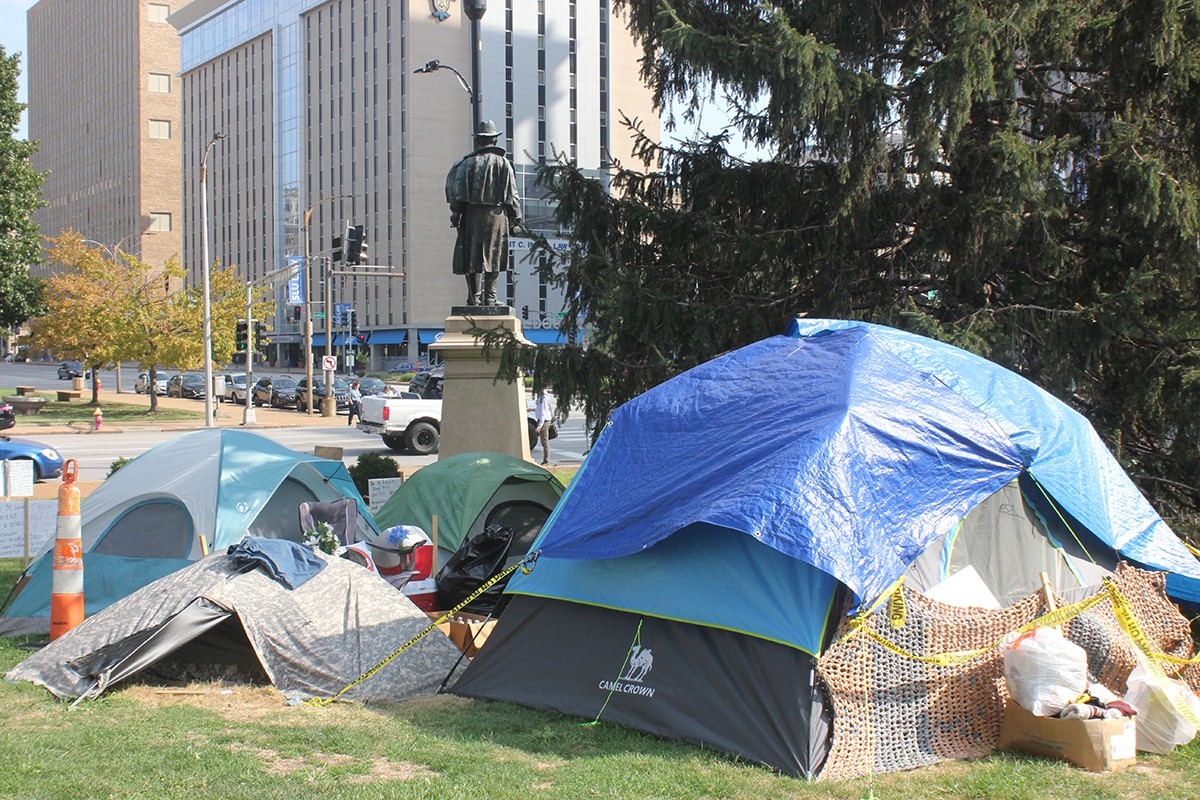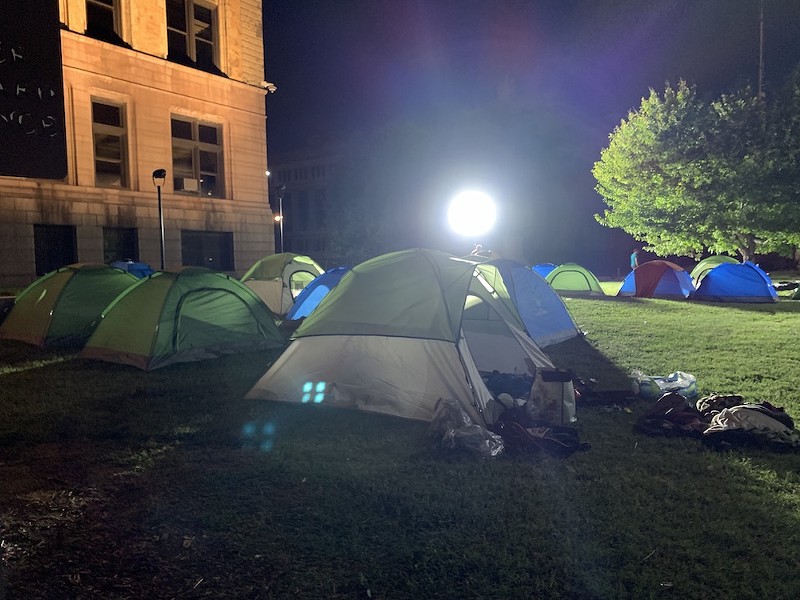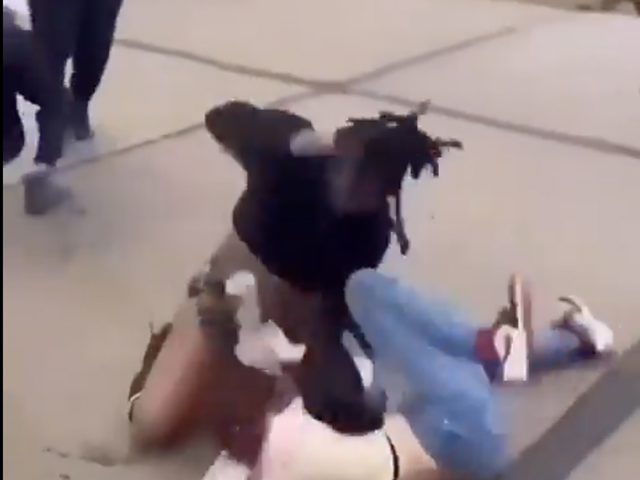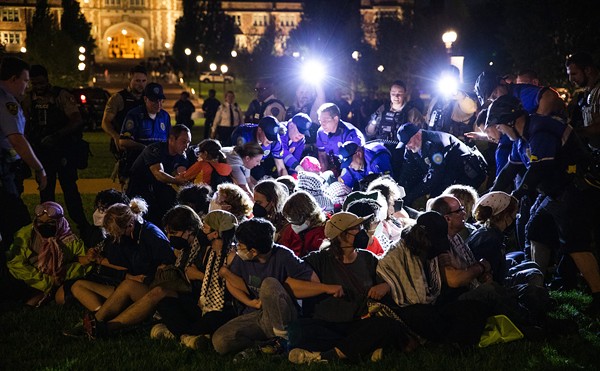The St. Louis Board of Aldermen remains divided on a plan that would change the way new shelters for the city’s unhoused residents are approved — but the bill seems headed for a final vote at the end of the 2023-2024 session next week. There is just one more public hearing scheduled for today, likely the last public comment for the bill before the session ends.
The fast-tracked bill has led to some grumbling by opponents, as well as some aldermen. Last Thursday, the bill’s committee hearing was scheduled directly after a Public Safety Committee hearing on the Re-Envisioning the Workhouse report. This led to a disgruntled public, cut off public comments and a hurried vote as the meeting went into overtime.
Aldermanic President Megan Green’s office says the bill is a priority this session. Green is a co-sponsor of the legislation.
The bill would change the city’s current plat and petition process for new shelters. Instead of requiring a majority of registered voters or property owners in a 500-feet area around the site to approve the location, it would require one-third of those community members.
Despite some people claiming that this will silence the voices of neighborhoods, its sponsor, 7th Ward Alderwoman Alisha Sonnier, says it will do the opposite.
The idea that Board Bill 227 makes it easier to open a shelter in the city of St. Louis is a misconception, Sonnier says. Instead, it aims to make the process possible.
In 15 years, the city hasn’t built any new shelters due to the current process, according to Sonnier.
The bill would also require shelter operators to mail postcards to all households or businesses within 500 feet and will hold a minimum of three public hearings, allowing residents to ask questions and collaborate on shelter plans.
Once an application is filed, a public hearing will be scheduled. The periodic public hearings outlined in the bill will go hand in hand with a temporary permit process that will allow residents to have greater say if a shelter becomes a problem or issues need to be addressed as it settles into the neighborhood.
Additionally, signature verification will move to the Board of Election Commissioners, and the Department of Human Services will have the ability to review shelter plans and either support or reject them at every stage of the process.
“The current plat & petition process for shelters unfairly silences many residents. Only those within a narrow 500-foot radius can vote ‘yes’ or ‘no’ — no voice for neighbors beyond that arbitrary line,” Sonnier says in a written FAQ statement to constituents. “This exclusionary system restricts public input and limits valuable perspectives from both neighbors and providers.”
Despite running as progressives, several aldermen have stood in staunch opposition to changes to the shelter approval process. One of these is Ward 9 Alderman Michael Browning, who activists have accused of standing in the way of the bill’s passage.
“Enough. Is. Enough. Michael Browning says he’s in the so-called ‘progressive majority’ on the Board of Aldermen. But BB 227 probs won’t pass on April 5 unless he votes for it,” activist Jake Lyonfields said in a post to X. “So let’s keep holding his feet to the fire, cause we finally have the opportunity to modernize how we open shelters in our city, and we can’t let some too-cautious white dude masquerading as progressive stop us.”
Browning voted “present” at the committee meeting. First Ward Alderwoman Anne Schweitzer was the sole member of the committee to vote against the bill.
Last year, Sonnier introduced the “Unhoused Bill of Rights,” which would make it easier to place shelters in the city, create intentional encampments with services and make it more difficult for officials to displace unhoused community members. The proposal set off a firestorm, leading Sonnier to write Bill 227 and focus it more tightly on reforming the shelter approval process.
“This legislation isn’t about BB’s 126, 127, or 128, forget about those proposals,” Sonnier writes in her FAQ. “BB 227 is about updating the plat & petition process to better serve our community.”
People opposed to the bill say they feel as though their voice is being taken out of the equation. Those in favor of the change argue that not only is it necessary to better serve the unhoused community, but that folks forget that the unhoused are their neighbors too.
David Rodriguez, secretary and treasurer for St. Louis Firefighters Local 73, said at last Thursday’s meeting that while he is not taking a stance on Board Bill 227 he wants to address the state of care for many unhoused people in St. Louis.“As firefighters and emergency medical workers we respond to numerous calls from the unhoused community, often not for life-threatening emergencies but for ongoing care, prescription refills, mental health support or even shelter during extreme weather, " he says. “These are often third-party calls for an unknown problem and some are from well-meaning bystanders, and some are also attempts to have those people relocated. When there is no continuum of care plan, when those people leave the hospital or the last social service that they received, it often falls back on our shoulders.”
Responding to these calls means resources are tied up with a fire truck and ambulance unavailable for other potential emergencies. It can also contribute to compassion fatigue and burnout among firefighters, he says.
“We hope that any legislation enacted will help us provide a comprehensive approach in responding to the diverse needs of the unhoused in the city of St. Louis,” Rodriguez says.
Following the bills passage out of committee, Sonnier posted a statement online saying:
“Today’s win is for the 20 percent of our SLPS scholars who are housing insecure, for the kids like me who had to escape domestic violence, and for the families who have been asking for this type of support from the city for years. We aren’t through the forest yet, but today was a giant step forward to ensuring that our city has a place for all to live, not just some.”
The last day of the legislative session is April 15. Board Bill 227 has had its second reading and the next steps before final passage include a debate and vote for perfection, perfection/the addition of any necessary corrections, and then a third reading and vote. If the bill passes the board, Green would sign it and it would then be sent to Mayor Tishaura Jones for her signature.
A spokesperson for the mayor’s office says she is still evaluating the bill and is unsure of whether she will sign it.
Subscribe to Riverfront Times newsletters.Follow us: Apple News | Google News | NewsBreak | Reddit | Instagram | Facebook | Twitter | Or sign up for our RSS Feed








